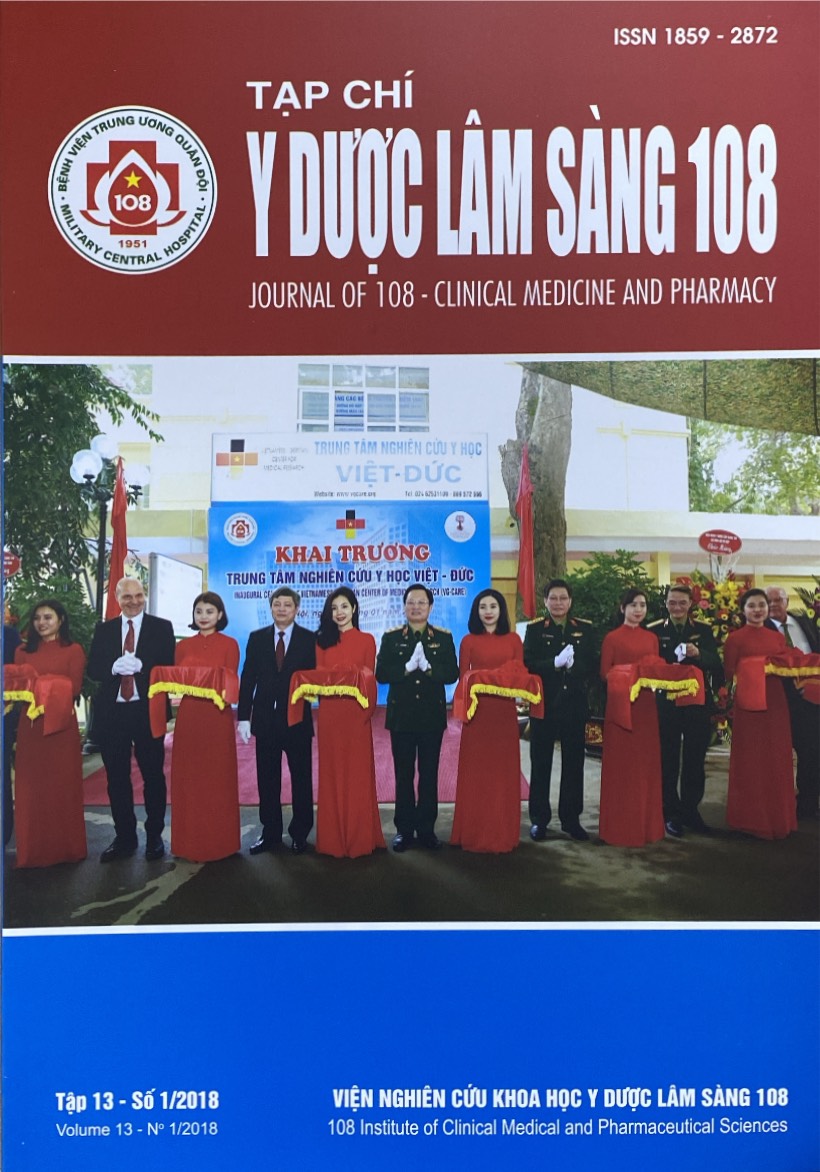Safety of radioembolization with Yttrium-90 microspheres for the treatment of hepatocellular carcinoma
Main Article Content
Abstract
Objective: To evaluate the safety of radioembolization with Yttrium-90 microspheres for the treatment of hepatocellular carcinoma. Subject and method: A prospective interventional uncontrolled study: 52 hepatocellular carcinoma patients having an average tumor size of 9.8 ± 3.0cm were treated with Yttrium-90 microsphere radioembolization at 108 Military Central Hospital from October 2013 to September 2017. Catastrophes, complications and side effects were monitored and evaluated after treatment. Result: All of 53 interventional times were technologically successful and no deaths related to interventional techniques. The complication rate was low including 01 case of radiation pneumonitis (1.9%) and 01 case of gastrointestinal bleeding due to peptic ulcer (1.9%). The rates of symptoms of post-embolization syndrome including liver pain, fever, fatigue, nausea and vomiting were low, 26.9%; 5.8%; 17.3% and 7.7%, respectively. AST, ALT and bilirubin levels significantly increased after 1 - 2 days of intervention but recovered at 4 - 6 weeks after treatment. Albumin and prothrombin levels significantly reduced after intervention but remained within the normal range and recovered at 4 - 6 weeks. Conclusion: Radioembolization with Yttrium-90 microspheres are safety for the treatment of hepatocellular carcinoma.
Article Details
References
2. Phan Thị Phi Phi (1993) Góp phần nghiên cứu ung thư gan nguyên phát ở Việt nam, tần xuất HBsAg trong huyết thanh người lành và người bị ung thư biểu mô tế bào gan. Y học Việt Nam, 171, tr. 26-30.
3. Floridi C, Pesapane F, Angileri SA et al (2017) Yttrium-90 radioembolization treatment for unresectable hepatocellular carcinoma: A single-centre prognostic factors analysis. Medical Oncology 34(10): 174.
4. Jemal A, Bray F, Center MM et al (2011) Global cancer statistics. A Cancer Journal for Clinicians 61(2): 69-90.
5. Kallini JR, Gabr A, Salem R et al (2016) Transarterial radioembolization with Yttrium-90 for the treatment of hepatocellular carcinoma. Advances in Therapy 33: 699-714.
6. Kokabi N, Camacho JC, Xing M et al (2015) Open-label prospective study of the safety and efficacy of glass-based Yttrium-90 radioembolization for infiltrative hepatocellular carcinoma with portal vein thrombosis. Cancer 121(13): 2164-2174.
7. Lau WY, Ho S, Leung TW et al (1998) Selective internal radiation therapy for nonresectable hepatocellular carcinoma with intraarterial infusion of 90yttrium microspheres. International Journal of Radiation Oncology, Biology, Physics 40(3): 583-592.
8. Leung TW, Lau WY, Ho SK et al (1995) Radiation pneumonitis after selective internal radiation treatment with intraarterial 90yttrium-microspheres for inoperable hepatic tumors. International Journal of Radiation Oncology, Biology, Physics 33(4): 919-924.
9. Mahnken AH (2016) Current status of transarterial radioembolization. World Journal of Radiology 8(5): 449-459.
10. Mazzaferro V, Sposito C, Bhoori S et al (2013) Yttrium-90 radioembolization for intermediate-advanced hepatocellular carcinoma: A phase 2 study. Hepatology 57(5): 1826-1837.
11. Sangro B, Carpanese L, Cianni R et al (2011) Survival after Yttrium-90 resin microsphere radioembolization of hepatocellular carcinoma across Barcelona clinic liver cancer stages: A European evaluation. Hepatology 54(3): 868-878.
12. Tan CH, Low SC, Thng CH (2011) APASL and AASLD consensus guidelines on imaging diagnosis of hepatocellular carcinoma: A review. International Journal of Hepatology: 519783.
 ISSN: 1859 - 2872
ISSN: 1859 - 2872
